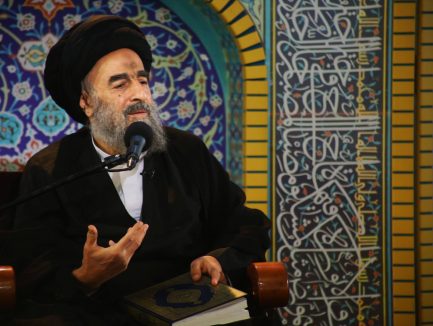
RNA – A number of members of Iraq’s Popular Mobilization Forces deployed to the Tal Afar and Sinjar regions, along with religious leaders and leaders of a number of Yazidi tribes, met with Ayatollah Sayyid Mohammad-Taqi al-Modarresi, a senior Iraqi Shi’ah cleric and scholar.
During this visit, he described the Quran as “a book of life” and stated, “In the Holy Quran, God spoke about this world and the hereafter and in various parts of this divine book, He advised men to have piety, especially during the time of war.”
Ayatollah al-Modarresi added, “The Iraqi people have been struggling with various difficulties and problems, such as the era of the dictatorship of Saddam Husayn, the occupation by the United States and the Daesh Takfiri phenomenon over the past few years. For this reason, we need a spiritual breeze to free the people from the state of war and its problems and to inject solidarity and cooperation into the hearts of all.”
The senior Iraqi scholar described the movement of Imam al-Husayn and the pilgrimage of Arba’in al-Husayni as establishing a very good spiritual state for the people of this country and stated, “The presence of millions of people of various tribes, ethnicities, races, nations, countries and the munificence and forgiveness of the people on the day of Arba’in al-Husayni led to the increase of love, unity and cooperation.”
He stressed on the necessity of using the spiritual season of Arba’in al-Husayni and said, “This spiritual atmosphere must be for increasing piety, getting rid of evil thoughts, withdrawing from personal, sectarian and ethnic interests and benefiting from the attention of God Almighty.”
Ayatollah al-Modarresi emphasized that, despite many difficulties, the Iraqi people have never succumbed to the problems they face, but rather they have become stronger every day and added, “We must rebuild our country, which has been destroyed by war after war, and bring it to its main place in the world.”
During his meeting with Ayatollah al-Modarresi in the Holy City of Karbala, Iraqi Interior Minister Qasim al-Araji explained the most important measures taken to liberate the occupied cities from the grip of Daesh, as well as the efforts of the security forces to establish order and security for the pilgrims participating in the Arba’in pilgrimage.
Ayatollah al-Modarresi also praised the day-and-night efforts of the security forces and said, “The actions that the security forces are doing is truly a unique and exceptional effort.”
Arba’in, meaning “forty” is a Shi’ah Muslim religious observance that occurs forty days after the Day of Ashura. It commemorates the martyrdom of Imam al-Husayn ibn Ali, the grandson of the Prophet Muhammad, who was killed on the tenth day of the month of Muharram alongside 72 of his companions by the tyrannical caliph Yazid I’s army in the Battle of Karbala in 61 AH (680 CE).
During the days leading up to Arba’in, millions of pilgrims from Iraq, Pakistan, India, Iran, Bahrain, Saudi Arabia, Lebanon, Azerbaijan, Turkey and elsewhere walk to the city of Karbala, where Imam al-Husayn and his companions are buried from Najaf, another holy city in Iraq, to show their devotion. The two cities are more than 75 kilometres apart.
This year, the day of Arba’in will fall on November 9th and on this day, the pilgrims will converge on the city of Karbala and make a pilgrimage to the holy shrines of Imam al-Husayn, his brother Abbas ibn Ali, and his companions.